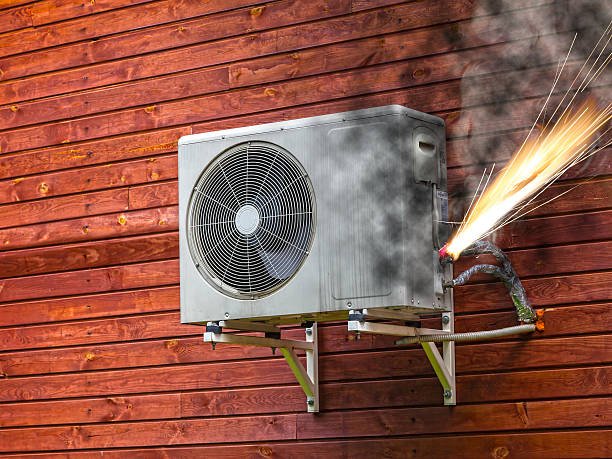
Overloaded electrical circuit causing electrical short and fire.
What is Breaking AC?
Breaking AC refers to the failure or malfunction of an air conditioning system, which can manifest through various symptoms affecting its performance. A well-functioning air conditioner is essential for maintaining comfortable indoor temperatures, especially during hot weather. When an air conditioning unit begins to break down, it may exhibit common signs such as unusual noises, inadequate cooling, and frequent cycling on and off. Recognizing these signs promptly can prevent further damage and costly repairs.
Unusual noises are often an initial indicator of breaking AC. These sounds may include hissing, grinding, or banging, suggesting issues with internal components such as the motor or compressor. If the air conditioner is not producing adequate cooling, it may signal a refrigerant leak or a malfunctioning thermostat, both of which require immediate attention. Similarly, frequent cycling, where the unit turns on and off more often than usual, can indicate an oversized or inefficient system, potentially impacting energy efficiency and comfort levels.
A variety of air conditioning systems are available, including central air conditioners, window units, and split systems. Each type operates differently and may experience breaking AC symptoms uniquely. Central air conditioning systems may struggle with airflow issues stemming from clogged filters or duct problems, while window units might face challenges related to electrical components due to their compact design. Understanding the specific symptoms for the type of air conditioning system in use is crucial for diagnosing and addressing problems effectively.
Overall, breaking AC represents a significant concern for homeowners and businesses alike, highlighting the importance of regular maintenance and timely interventions to ensure optimal performance of air conditioning systems.
Causes of Breaking AC
Air conditioning systems are crucial for maintaining comfort in indoor environments, yet they can experience failures that lead to breakdowns. Understanding the causes of a breaking AC unit is essential for homeowners to effectively prevent issues and ensure the longevity of their systems. One of the primary factors contributing to air conditioning failures is a lack of regular maintenance. When air conditioners are not routinely serviced, dust and debris can accumulate, which may obstruct airflow and lead to overheating.
Refrigerant leaks also represent a significant threat to the efficiency and functionality of an air conditioning unit. Refrigerant is essential for the cooling process, and any loss of this fluid can result in inadequate cooling performance and increased energy consumption. Identifying leaks often requires thorough inspections, as they may not be immediately visible. Additionally, these leaks can put undue strain on the compressor, potentially causing it to fail.
Electrical problems are another common cause of AC breakdowns. Issues such as damaged wiring, faulty capacitors, or circuit breaker tripping can disrupt the operation of an air conditioning system. These electrical failures can lead to system shutdowns or even pose safety hazards if not addressed promptly. Regular inspections can help detect and resolve electrical malfunctions before they escalate into more severe problems.
Furthermore, wear and tear should not be overlooked as a contributor to air conditioning failures. Over time, components such as compressors, fans, and coils can deteriorate, leading to decreased efficiency or complete system breakdown. Ensuring that these components are checked during routine maintenance can help in identifying and replacing worn parts before they cause significant issues. By being aware of these causes, homeowners can take proactive measures to maintain their air conditioning units effectively.
Preventive Maintenance Tips for Avoiding Breaking AC
Preventive maintenance is crucial for ensuring the longevity and efficiency of air conditioning systems. By following a few simple strategies, homeowners can significantly reduce the risk of their AC units breaking down. One of the most effective measures is to schedule regular servicing with a qualified technician. Routine inspections and tune-ups can identify potential issues before they escalate, saving both time and money in the long term.
Another essential task is to change the air filters consistently. Clogged filters can restrict airflow, causing the system to work harder than necessary, which may lead to overheating and eventual breakdown. It is advisable to check the filters every month and replace them at least every three months, or more frequently if the system is used heavily or if pets are present in the home.
Moreover, keeping the outdoor unit clean is vital for optimal performance. Ensure that the area surrounding the unit is free from debris, such as leaves, dirt, and vegetation, as these can impede airflow. Regularly cleaning the condenser coils will also help maintain efficiency, thereby preventing strain on the unit. It is recommended to gently wash these coils with a garden hose when necessary.
Monitoring thermostat settings is equally important. Avoid setting the temperature drastically lower than the current room temperature, as this can lead to excessive strain on the system. Instead, opt for gradual temperature changes to promote efficient cooling.
Lastly, recognizing early warning signs of an impending failure can make a significant difference in extending the AC’s lifespan. Unusual sounds, fluctuating temperatures, and increased energy bills may all signal that your unit requires attention. By staying vigilant and addressing concerns promptly, you can ensure that your air conditioning system remains in optimal condition.

When to Call a Professional for Breaking AC Issues
Determining when to call a professional for air conditioning problems is crucial for ensuring both safety and the efficiency of your AC system. While some minor issues may be resolved with basic troubleshooting or DIY solutions, there are certain situations where professional intervention is necessary. Engaging a qualified technician not only guarantees proper handling of complex issues but also provides peace of mind.
One of the key indicators that you should seek professional help is when your air conditioner is not cooling effectively. If you have checked the thermostat settings, air filters, and ensured that the unit is running, yet the AC fails to maintain cool temperatures, it is likely an indication of a more serious problem. This could stem from issues such as refrigerant leaks or malfunctioning compressors, both of which require advanced technical skills for proper diagnosis and repair.
Another critical scenario involves electrical issues. If you notice any unusual sounds, smells, or tripping circuit breakers associated with your AC, you should refrain from attempting to troubleshoot the issue yourself. Electrical problems can pose significant safety hazards, including the risk of fires or electric shocks. It is advisable to let a professional technician address these concerns, as they possess the expertise to evaluate and resolve electrical hazards safely.
breaking ac Moreover, tasks involving refrigerant handling are strictly regulated and should only be executed by licensed professionals. The proper recovery, recycling, and disposal of refrigerants are essential to not only comply with environmental regulations but also to ensure the safe functioning of your air conditioning system. Attempting to manage refrigerants without the proper certifications can lead to significant fines and consequences.
Recognizing the limits of DIY repairs is vital. By engaging a professional at the first sign of a significant issue, you not only protect yourself but also extend the life of your air conditioning system. Investing in expert help ultimately ensures optimal functionality and safety when dealing with breaking AC problems.



